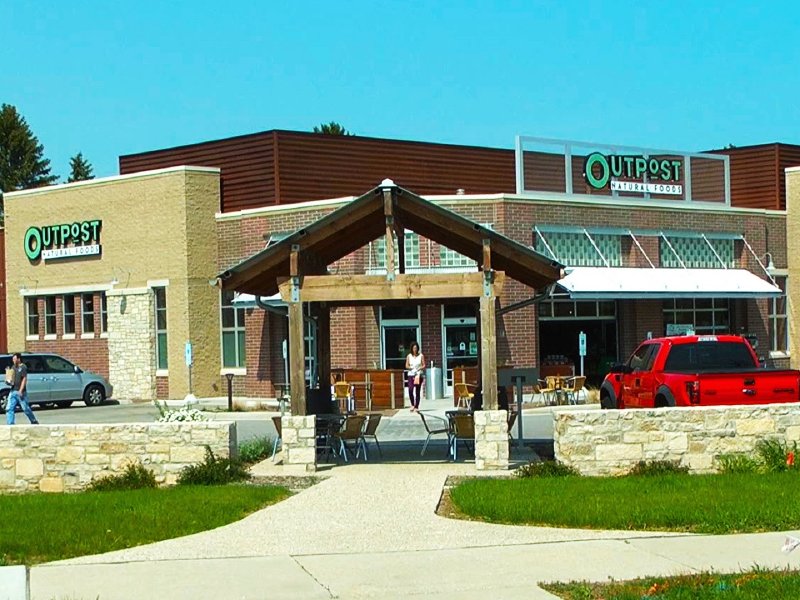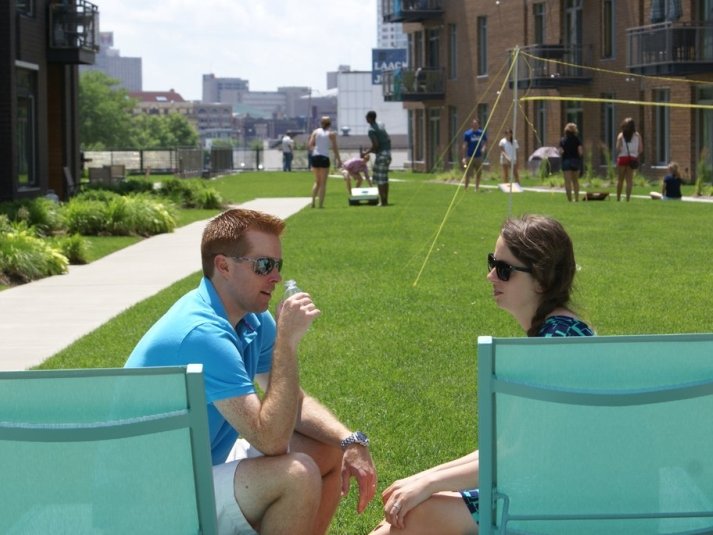The Milwaukee Metropolitan Sewage District (MMSD) provided funding for half of the green infrastructure and water management at Outpost's new Mequon store. This included porous pavement, underground cisterns for roof rainwater, rain gardens and reverse osmosis system for flushing public toilets.
For this and other reasons Outpost is a MMSD green luminary and a champion of the environment "who recognizes not only the need to manage stormwater, but also the need to innovate and grow, to create lasting good works that connect people and prosperity to the environment."
To help highlight MMSD Green Luminaries, I'll focus on the winners by asking questions about their practices and new environmental approaches.
MMSD’s goal is to create enough green infrastructure in the region to capture 740 million gallons of water every time it rains, to reduce water pollution, and improve Lake Michigan and our rivers.
First up, of course, is the new Outpost store in Mequon. Jessy Servi, Outpost Natural Foods' sustainability manager, took the time this week via email to answer the following.
OnMilwaukee.com: Your Mequon store can manage 46,000 gallons of water every time it rains. How?
Jessy Servi: At our Mequon store location we were able to design the site to manage rain water where it falls, which includes rain gardens, a rain water catchment system, porous pavement and landscaping.
The rain gardens account for the largest portion, capturing up to 23,300 gallons of water with each rain event. Rain gardens are not only attractive and planted with plants that tolerate both wet and dry conditions, they also recharge local groundwater and filter runoff pollution, helping to protect our local rivers and streams. Other landscaping, in addition to the rainwater plantings help attract pollinators and beneficial insects to our site that pollinate our orchard and fruit bearing edibles.
Making up about 20 percent of our parking lot are 16 porous asphalt parking stalls which allow an extra 8,000 gallons of water to infiltrate into the rain gardens.
We also catch water that falls on our roof and store it in two 4,000 gallon concrete tanks underground. That water is used to irrigate our "Kitchen Garden" where we have 13 raised bed gardens under cultivation with food crops for the stores Fork Café.
OMC: The entire property is actually a zero runoff site. Explain what that means.
JS: A zero runoff site means, well, just like it sounds. That no water leaves your site during a rain event. That all the water that falls from the sky is managed on the property it lands on. Pretty simple, yet not as common as you would think. Zero runoff sites help protect the local infrastructure, reducing dependency on water mains, and keeps polluted runoff out of our waterways.
OMC: Why did Outpost decide to build these green infrastructure projects?
JS: As a cooperative we are owned by the community and we exists so that our owners have a healthy, diverse and sustainable community. With the opportunity to build a site from the ground up, being good land and community stewards was a no brainer for us, it's who we are. Not to mention with the Milwaukee River just one mile down the road and with that big bountiful lake to our east, improving water quality and protecting current infrastructure is eminent.
OMC: Do you recycle any of the water you collect? If so, is it helping save money on your water bill?
JS: The 8,000 gallons of water that falls on our roof and used for landscape irrigation is 8,000 gallons of water we don't have to purchase from the city. I'd say that's a savings. We also catch water off the outdoor pavilion in rain barrels – also used for irrigation – and in our store vestibule we reuse waste water from the Glacier Reverse Osmosis machine to flush the public toilets. A one of a kind project.
OMC: What kind of comments do you get from customers about all the green infrastructure work?
JS: Outpost owners expect us to do good things. And we do. We have been well received in the Mequon community and customers comment on how beautiful the grounds are. Educational signs throughout the store and exterior help guide customers to the green infrastructure.
OMC: Define success for Outpost.
JS: For Outpost success is measured in the triple bottom line; the people, the planet and profit. We are successful when our community and its inhabitants are healthy and thriving in additional to us having healthy profits. We are successful when the community has access to products and services that promote personal and environmental health, when they have access to organically and locally produced goods and are educated about choices that impact personal and environmental health. We also define success in that our community is locally owned and our owners have a sense of connectedness, belonging and fellowship.
A life-long and passionate community leader and Milwaukeean, Jeff Sherman is a co-founder of OnMilwaukee.
He grew up in Wauwatosa and graduated from Marquette University, as a Warrior. He holds an MBA from Cardinal Stritch University, and is the founding president of Young Professionals of Milwaukee (YPM)/Fuel Milwaukee.
Early in his career, Sherman was one of youngest members of the Greater Milwaukee Committee, and currently is involved in numerous civic and community groups - including board positions at The Wisconsin Center District, Wisconsin Club and Marcus Center for the Performing Arts. He's honored to have been named to The Business Journal's "30 under 30" and Milwaukee Magazine's "35 under 35" lists.
He owns a condo in Downtown and lives in greater Milwaukee with his wife Stephanie, his son, Jake, and daughter Pierce. He's a political, music, sports and news junkie and thinks, for what it's worth, that all new movies should be released in theaters, on demand, online and on DVD simultaneously.
He also thinks you should read OnMilwaukee each and every day.







